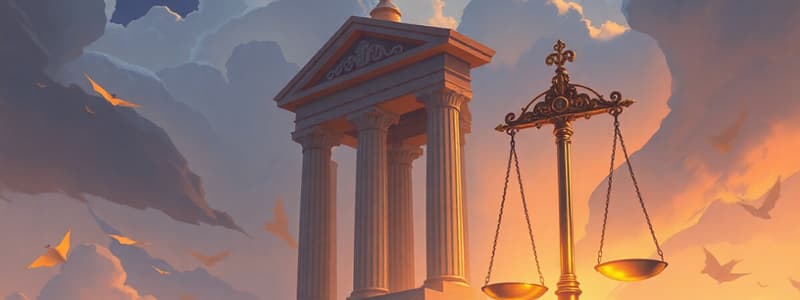Podcast
Questions and Answers
What is the primary source of law in civil law countries?
What is the primary source of law in civil law countries?
- Customary law
- Case law
- Statute law (correct)
- International law
Which of the following is NOT a component of legislation created by Parliament?
Which of the following is NOT a component of legislation created by Parliament?
- Acts
- Regulations (correct)
- Codes
- Constitution
In the event of a conflict between statute law and case law, what must the courts do?
In the event of a conflict between statute law and case law, what must the courts do?
- Seek a new law
- Follow statute law (correct)
- Ignore statute law
- Follow case law
What does delegated legislation allow Parliament to do?
What does delegated legislation allow Parliament to do?
Which structure is NOT typically a part of a legal norm?
Which structure is NOT typically a part of a legal norm?
What are legal norms primarily established to do?
What are legal norms primarily established to do?
When presenting a legal norm, which of the following is NOT necessary?
When presenting a legal norm, which of the following is NOT necessary?
Which of the following best describes a mandatory rule of social behavior established by the state?
Which of the following best describes a mandatory rule of social behavior established by the state?
What is the primary role of the state in society?
What is the primary role of the state in society?
Which power of the state is responsible for interpreting the law?
Which power of the state is responsible for interpreting the law?
According to Social Contract Theory, law represents what?
According to Social Contract Theory, law represents what?
What distinguishes legal rules from non-legal rules?
What distinguishes legal rules from non-legal rules?
According to the Marxist Theory, what is the essence of law?
According to the Marxist Theory, what is the essence of law?
Which of the following theories considers law to be created by God?
Which of the following theories considers law to be created by God?
What fundamentally differs between rules and laws?
What fundamentally differs between rules and laws?
What social factor primarily influences the state?
What social factor primarily influences the state?
What does the social face of the state emphasize?
What does the social face of the state emphasize?
According to the Marxist theory, the evolution of the state process follows which sequence?
According to the Marxist theory, the evolution of the state process follows which sequence?
Which of the following is a characteristic of the state as defined in the content?
Which of the following is a characteristic of the state as defined in the content?
What does the economic aspect of the state's nature involve?
What does the economic aspect of the state's nature involve?
What does the Social Contract Theory posit regarding the origins of the state?
What does the Social Contract Theory posit regarding the origins of the state?
Which of the following is NOT a non-Marxist theory regarding the origin of states and law?
Which of the following is NOT a non-Marxist theory regarding the origin of states and law?
In the context of state nature, what does the term 'class-conscious face' imply?
In the context of state nature, what does the term 'class-conscious face' imply?
What is a primary function of the state as detailed in the content?
What is a primary function of the state as detailed in the content?
Flashcards
State's Role in Society
State's Role in Society
The state's role in maintaining order, providing public services, and regulating social interactions.
Social Influences on the State
Social Influences on the State
The influence of public opinion, social movements, and cultural norms on the state's actions.
Legislative Power
Legislative Power
The power to create laws.
Executive Power
Executive Power
The power to implement and enforce laws.
Signup and view all the flashcards
Judicial Power
Judicial Power
The power to interpret the meaning of laws.
Signup and view all the flashcards
Social Contract Theory
Social Contract Theory
The theory that laws represent the collective will of the people.
Signup and view all the flashcards
Psychological Theory of Law
Psychological Theory of Law
The idea that laws reflect people's natural understanding of right and wrong.
Signup and view all the flashcards
Marxist Theory of Law
Marxist Theory of Law
Laws are rules enforced by authorities within a society. They reflect the economic base of that society.
Signup and view all the flashcards
Statute Law
Statute Law
The main type of law in countries like France, Germany, and the Netherlands. It originates from written rules created by the government.
Signup and view all the flashcards
Legislation
Legislation
Laws created by Parliament, the highest law-making body.
Signup and view all the flashcards
Codes
Codes
A specific type of legislation that sets out a complete set of rules for a particular area of law, for example, the Civil Code or Criminal Code.
Signup and view all the flashcards
Delegated Legislation
Delegated Legislation
Laws created by government agencies or ministers who are given the power to do so by Parliament.
Signup and view all the flashcards
Legal Norm
Legal Norm
A basic rule of behavior enforced by the state. It guides how people interact and includes parts like the situation it applies to, the required action, and consequences for breaking the rule.
Signup and view all the flashcards
Assumption (Hypothesis) of a Legal Norm
Assumption (Hypothesis) of a Legal Norm
The part of a legal norm describing who, when, and under what circumstances the rule applies.
Signup and view all the flashcards
Regulation (Disposition) of a Legal Norm
Regulation (Disposition) of a Legal Norm
The part of a legal norm stating what action is required, prohibited, allowed, or how something should be done.
Signup and view all the flashcards
Sanction of a Legal Norm
Sanction of a Legal Norm
The consequence of breaking a legal norm.
Signup and view all the flashcards
Maxist Theory
Maxist Theory
A theory that explains the origin of states and laws by focusing on the role of class struggle and economic factors. It argues that the state emerged as a tool to maintain the interests of the ruling class and suppress the working class.
Signup and view all the flashcards
Theory of Violence
Theory of Violence
This theory of origin of states and laws suggests that the state arises from the use of force and violence, often by a powerful individual or group. It highlights the role of coercion and domination in the establishment of political authority.
Signup and view all the flashcards
Theology
Theology
A theory that explains the origin of states and laws based on religious beliefs and divine authority. It argues that political power is derived from God, and that rulers are chosen by God to serve as his representatives on earth.
Signup and view all the flashcards
State
State
A political organization that has a monopoly over the legitimate use of violence within a defined territory. It's responsible for protecting the rights and interests of its citizens, maintaining the stability of society, and enforcing laws.
Signup and view all the flashcards
Class-conscious face of the state
Class-conscious face of the state
The state is an independent entity from society and exists to serve its own interests, which are often aligned with those of the ruling class. The state's actions, policies, and ideologies reflect this class bias.
Signup and view all the flashcards
Social face of the state
Social face of the state
The state actively shapes and is shaped by social relations. It interacts with and influences various social structures, including family, education, and religion. This view recognizes the complex interplay between the state and society.
Signup and view all the flashcards
Class consciousness
Class consciousness
A characteristic of the state where it is influenced by and influences the class structure of society. The state's economic policies, political decisions, and propagated ideologies often reflect the interests of the dominant class.
Signup and view all the flashcardsStudy Notes
PLĐC - Introduction to Law (Foreign Trade University)
- The document is study notes about Introduction to Law at Foreign Trade University
- It covers various topics in the field of law, including state and law, origin of states and law, theories regarding the origin of law, nature of state, law definition, rules and laws, legal vs non-legal rules, law and morality, law and custom, public and private law, and criminal vs civil law
Topic 1: State and Law
- Non-Maxist theories include Theory of Violence, Theology, and Social Contract Theory
- Origin of the state follows Maxist theory: Primitive community/classless society -> class society -> state
- Economic causes involved in states can be seen as having three stages of labor and private ownership occurrence
- Special political organization, protecting the ruling classes' rights/interests, maintaining social stability are features of the state
- The state has the power to enforce its rules
Nature of State
- Class-conscious face: The state is influenced by and influences the class structure of society, often reflecting the interests of the dominant class.
- Social face: The state shapes and is shaped by social relations, interacting with various social structures and ensuring social order
Origin of Law
- Non-Marxist: Laws represent the general will of the community, intuition of correct conduct, and the rule of God.
- Marxist: Laws are legally enforceable rules by authorities within a society, reflecting the prevailing economic system.
Essence of Law
- Rules and laws are meant to dictate what is/isn't allowed by a given society
- Legal rules apply in all of society and distinguish between legal and non legal rules; non-legal rules are specific to given groups or social settings
Law and Morality
- Morality focuses on concepts of good, evil, right, and wrong in a broader context.
- Morality is not enforceable, unlike legislation. It's about intentions and attitudes as opposed to only visible behavior
Law and Custom
- Customs are widely-recognized societal rules formed over time
- Customs should not contradict general legal principles
Law and Other Concepts
- Laws, customs, and morals are distinct concepts, but they interact with each other within a society
- Law is formed and influenced by moral and societal standards, which sometimes directly conflict with and contradict them
Classification of Laws
- Public law is concerned with how a government interacts with its citizens.
- Private law concerns the relations between individuals.
- Criminal law focuses on crimes against society.
- Civil law deals with disputes between individuals.
Substantive and Procedural Law
- Substantive law defines rights and obligations of individuals in a given society.
- Procedural law outlines the methods of enforcing substantive law , the processes involved in resolving disputes.
Sources of Law
- Customs: time-tested rules of conduct accepted within a society.
- Statute Law: written laws passed by legislative bodies.
- Case Law: rules derived from judicial decisions in past cases
Civil Law in Vietnam
- Civil law defines relations between individuals/organizations in a given society.
- Key elements include: parties, objects, and their rights and obligations.
- Essential components of a civil relation are the parties, the subject matter, the conditions and the legal norms, or legal principle guiding their interaction
Legal Capacity
- Civil legal capacity - refers to a person's ability to participate in legal transactions/proceedings.
- Civil act capacity - refers to a person's ability to perform civil obligations by their own actions
Legal Norms
- Legal norms are general rules of conduct promulgated or recognized by a state/community
Studying That Suits You
Use AI to generate personalized quizzes and flashcards to suit your learning preferences.




